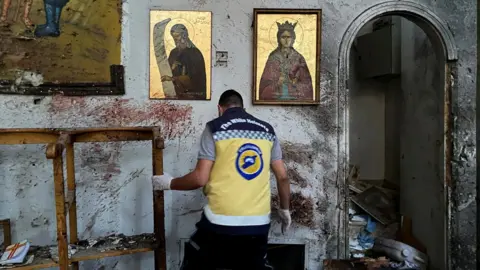On June 22, 2025, a tragic event unfolded in Dweila, a suburb of Damascus, Syria, where a suicide bombing occurred at Mar Elias Church. This devastating attack resulted in the death of at least 20 individuals, with an additional 52 people reported wounded, according to the Syrian health ministry. The incident marks a significant escalation in violence within the country, particularly affecting religious institutions that have long been a symbol of community and peace.
The attack took place during a service when the assailant, armed and affiliated with the jihadist group Islamic State (IS), reportedly entered the church premises, opened fire, and subsequently detonated an explosive vest. Eyewitness accounts describe a scene of immediate chaos and horror as the attacker began shooting at congregants before carrying out the explosion. The interior ministry confirmed that the perpetrator was linked to IS, although there has been no immediate claim of responsibility from the group itself.
In the wake of the bombing, the Syrian Civil Defence, commonly known as the White Helmets, shared alarming images and videos from inside Mar Elias Church. The footage revealed a heavily damaged altar, shattered pews strewn with glass, and a bloodied floor, painting a graphic picture of the events that transpired. It highlighted the bomb’s destructive impact on not only human lives but also the sanctity of a place of worship.
Witnesses recounted the harrowing moments during the attack. One individual told the AFP news agency that a man entered the church with a weapon and began firing indiscriminately. As chaos ensued, attempts were made by the congregation to subdue him before he could detonate his explosive device. Another witness, a worker at a shop nearby, described the aftermath, stating, “We saw fire in the church and the remains of wooden benches thrown all the way to the entrance.” Security forces quickly cordoned off the area, setting up an investigation in response to this unprecedented attack.
This bombing stands as the first of its kind in Damascus since the overthrow of Bashar al-Assad by rebel forces in December, reflecting a concerning shift in the security landscape of the city. Interim President Ahmed al-Sharaa, whose Sunni Islamist group, Hayat Tahrir al-Sham (HTS), is known to have been a former al-Qaeda affiliate, has publicly vowed to safeguard religious and ethnic minorities. Despite these assurances, Syria has experienced two waves of severe sectarian violence in recent months, underscoring the fragile stability of the region.
The Mar Elias Church, which is located not far from the eastern Bab Sharqi gate of Damascus’s Old City, has historically been a harmonious hub for diverse communities. The attack targeted not just individuals but also represented a strike against the fabric of coexistence that has characterized the area for decades. The repercussions of this tragic event extend beyond those immediately affected, reverberating throughout the community and restoring memories of past violence that many hoped were long behind them.
As the investigation continues, this bombing emphasizes the broader implications of extremism in Syria, particularly as the civil conflict and its aftermath continue to foster environments for drastic and violent actions. The demand for security and protection of all citizens, irrespective of their faith or background, becomes increasingly pressing. Furthermore, this incident calls attention to the urgent need for regional and international responses to address the underlying issues of terrorism and sectarian division that continue to plague Syria and its people.



